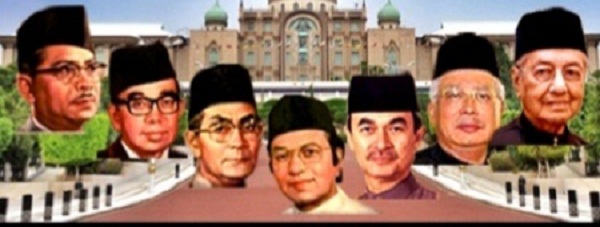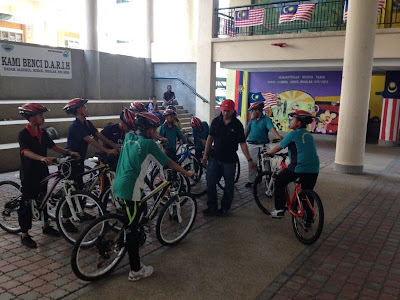Mr President,
Excellencies,
Ladies and gentlemen,
Allow me to begin by congratulating you, Mr President, on your election. I offer you Malaysia’s full cooperation and support as you seek to further the cause of peace and prosperity.
Ladies and gentlemen,
Three years ago, I stood before you and called for a Global Movement of Moderates. It was a call to reject extremism in all its forms.
Because the real divide is not between East and West or between the developed and developing worlds or between Muslims, Christians and Jews.
It is between moderates and extremists of all religions.
Much has changed since 2010. Then, a current of protest and reform surged through the Middle East and North Africa.
Out of the heat of the Arab Spring, new questions arose: about the pace of democratic change, about the role of Islam in politics, and about the need for more inclusive development.
But the search for answers to those questions has been put on hold.
As authoritarian regimes have fallen, and governments have been swept away by political change, extremists have tried to fill the space that remains.
Motivated by ideology, politics and religion, they have sought refuge from the hard work of development in the unholy practice of violence.
Conflicts have spilled across borders, inflaming old tensions, and igniting new ones. Around the world, extremism is taking lives and crushing opportunity.
This affects us all; but it is one people, of one faith, who suffer most. I believe the greatest threat to Muslims today comes not from the outside world, but from within.
The conflict between Sunni and Shia threatens the lives and livelihoods of millions of Muslims. Our religion – founded on peace, and premised on tolerance – is being twisted by extremists, who are deploying false arguments to foster division and justify violence.
Across the Islamic world, extremists are wrapping their perverse agenda in religious cloth; tearing families, countries and the ummah apart.
With each new atrocity, tensions are wound tighter, and peace seems further away.
The corrosive influence of extremism cannot be easily countered. But we are not powerless to act. I believe moderation in religion and the political process can stem the loss of life and liberty in the Muslim world.
Behind the tragic violence, there is a battle being waged for the future of Islam. By reaffirming our commitment to moderation – and solving the political problems that drive instability – we can seize back the centre ground.
We can marginalise the extremists. And we can advance an agenda for peace, harmony and justice.
Ladies and gentlemen,
Around the world, Muslims have watched in despair as conflict tears into some of our oldest communities. Rarely in our history has the ummah faced violence on this scale.
Right now, the world’s attention is rightly focused on Syria. United Nations investigators have concluded that the focus of the war has shifted along ethnic and religious lines, and become ‘overtly sectarian’.
A conflict which began with anti-government protests threatens to descend into a war of ethnic cleansing.
With fighters from Hezbollah engaging on Syrian soil, the conflict now threatens Lebanon too.
Last month, after car bombs killed dozens in Beirut, 42 people died in explosions outside Sunni mosques.
Communities are dividing along religious lines, with hard-line preachers urging violence between Sunni and Shia.
Meanwhile, the security situation in Iraq continues to unravel, as Sunni extremist groups and Shia militia struggle for control.
In the last four months, nearly 3,000 people have been killed. In the last week alone, three funerals have been bombed in Baghdad. Women and children have been blown apart whilst mourning.
Again, the violence is carried out between Sunni and Shia. In one Iraqi town, four children from one Shia family were slain with knives.
In another, local people – neighbours for generations – have built blast walls to keep themselves apart. Forced displacements are growing.
In Pakistan, bombings have wrecked the city of Quetta, killing hundreds. Revenge attacks spread to Lahore; bombs have been detonated in Karachi.
In August, militants ambushed buses, dividing the passengers according to belief; those who answered incorrectly were executed.
Each of these conflicts has a distinct cause, but they follow a darkly familiar path.
Emboldened by political failures, radical preachers and militant groups turn civil conflicts into wider religious wars. Yet the preaching of such violence is completely counter to the Islamic faith.
The Quran not only condemns suicide, unjust war, and retribution by force; it also makes clear the Prophet’s desire for Muslims to live in peace with one another and their neighbours.
Verse 8:61 says, ‘And if they incline to peace, then incline to it [also] and rely upon Allah’. Verse 5:32, that ‘whoever kills a soul unless for a soul or for corruption [done] in the land - it is as if he had slain mankind entirely’. And verse 2:256 holds that ‘there shall be no compulsion in religion’.
It should come as no surprise that there is no scriptural basis for the atrocities being committed in the name of Islam. Under the six higher objectives of Islamic law, the first and foremost is the protection and preservation of life.
Yet even during Ramadan, our holy month - when contemplation, devotion and compassion reign uppermost in Muslim minds - the extremists would not stop. More than 4,400 people died this Ramadan in Syria; 371 in Iraq; 120 in Pakistan.
This is a burden we can no longer afford to bear. It is time to end the killing, and concentrate instead on building a common agenda for peace and prosperity. There are two things we can do.
First of all, I believe that peace-loving Muslims – the overwhelming majority of Muslims – should unite against the extremists who use our religion as an excuse to commit violence.
And one of the most powerful tools we have to do so is al-wasatiyyah: the practice of moderation.
Verse 2:143 of the Quran says that ‘we have made you into a community that is justly balanced’. This concept – of balance and moderation, of social justice within our faith – is a central tenet of Islam. It asks of us that we hold to the principles displayed by the Prophet Muhammad (PBUH) in the Medina Charter.
Our task is to reclaim our faith, by articulating clearly the true nature of Islam: the religion of peace, of moderation, of tolerance.
We should speak this message clearly, so that all may hear it; and stand firm against the minority who use Islam to further violent and unjust ends.
We should not mistake moderation for weakness. To face those baying for violence and call instead for calm is a sign not of frailty, but of strength.
Muslim leaders should speak up and condemn such violence, lest their silence is mistaken for acceptance.
Moderation can be practiced at the national level, as is the case in Malaysia, by choosing mutual respect and inclusivity, and strengthening the bonds between different communities and faiths.
All countries should reinforce their commitment to the principles of moderation; not just in religion, but for sustainable development and stable economic growth.
Moderation can also direct regional policy. It sits at the heart of Malaysia’s efforts to bring peace to the southern Philippines, and to Thailand’s restive south.
And ASEAN, which endorsed the Global Movement of Moderates, has made a commitment to peaceful settlement and the non use of force in territorial disputes.
And at the international level, moderation can guide our approach to the great global challenges of our age: violent extremism, sustainable development, and equitable growth.
Secondly, we should give our all to resolve the political problems which raise tensions in the Muslim world – starting with Syria.
We cannot underline strongly enough the need for a Syrian-led inclusive political process.
Malaysia is against any unilateral action to resolve the conflict. All sides must come together to work out a political settlement.
We welcome the recent US-Russia Framework Agreement, condemn without reservation the use of chemical weapons, and call on the international community to intensify their efforts to explore all possible diplomatic options for peace under the auspices of the UN.
We must also find the vision and the political will to commit to a just solution for Palestine.
We fervently hope that progress towards a viable Palestinian state – based on pre-1967 borders, and with East Jerusalem as its capital – will be made, and that the US and other members of the Quartet continue to play their role as honest brokers in the process.
Only with peace can there be development and dignity for the Palestinian people.
Finally, we should continue to focus on building stronger and more prosperous societies, predicated on the rule of law and the practice of democracy.
The Arab Spring showed that the Muslim world is crying out for change. Governments must answer that call.
We must provide good governance to fight corruption, create jobs to tackle poverty, and deliver sustainable growth that builds a world of opportunity for our citizens.
We must create economies in which people can fulfil their own aspirations, not those of extremists.
By acting to solve our most difficult political problems, we can bring an end to the immediate suffering - in Syria, in Palestine, and in the wider world.
By committing to the cause of moderation, Muslims can secure something even greater.
We can reclaim our religion, choosing harmony and acceptance over division and conflict.
And we can broadcast a vision of Islam as it is understood by Muslims around the world: as a religion of peace, tolerance, and moderation.
Last month, when militants attacked those buses in Pakistan, a 19 year-old Sunni student named Ghulam Mustafa stood up for such a vision.
Confronting the Sunni gunmen, he said killing Shiites was wrong.
Ghulam was shot dead, but his life was not lost in vain.
With guns to their heads, the Sunnis on the bus refused to identify the Shia passengers who the gunmen wanted to kill.
In their defiance, we see the true measure of courage, and the true test of faith.
Under unimaginable pressure, facing the greatest possible threat, they chose to stand with their brothers and sisters. They chose unity over division.
Faced with unimaginable pressure, and the greatest possible threat, we must summon the will to do the same.



















































